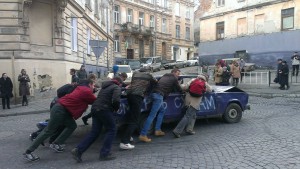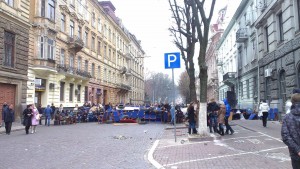Yesterday marked the bloodiest day so far since the protests started in Ukraine. In one single day in Kyiv alone, more than 100 people have been killed and more than 500 people have been hospitalized according to the Maidan medical service coordinator.
People were found on the streets with single gunshot wounds in the neck, head or heart. So they aren’t being shot by police officers with the reason to disperse the crowd. These are no fascist radicals who are out to murder police officers. They are just people who try to protest against Yanukovych’s regime and protect their fellow countrymen from harm, and for this they are being murdered in cold blood. For those still having a hard time to believe all this, watch this video of an innocent grandmother being shot out of nowhere (take care! this video has very graphic contents) in the city of Khmelnytskyi. For good reason, many Ukrainians feel their state has been captured by a corrupt elite, which uses the most extreme forms of violence against its own people and which cannot be dislodged by the usual democratic means.
 To understand the current divide in Ukraine, one has to understand the history and geography of the country and what is going on elsewhere. The western part of the country used to be part of the Austro-Hungarian Empire, and was Polish territory between the two World Wars. While the eastern part and Crimea used to belong to the Russian Tsar. This, of course, left its mark on the different regions both culturally and economically. The west, north and center of Ukraine are primarily Ukrainian-speaking, while in the east and in Crimea, Russian is the dominant language. It’s in that part of the country where Yanukovych has his political base as well as where most of the rich oligarchs pulling strings behind the scenes, are from.
To understand the current divide in Ukraine, one has to understand the history and geography of the country and what is going on elsewhere. The western part of the country used to be part of the Austro-Hungarian Empire, and was Polish territory between the two World Wars. While the eastern part and Crimea used to belong to the Russian Tsar. This, of course, left its mark on the different regions both culturally and economically. The west, north and center of Ukraine are primarily Ukrainian-speaking, while in the east and in Crimea, Russian is the dominant language. It’s in that part of the country where Yanukovych has his political base as well as where most of the rich oligarchs pulling strings behind the scenes, are from.
Of course, the real situation is far more complex than being described here. Almost all ethnic Ukrainians speak fluent Russian as well, and not everyone is so nationalistic that they hate everything Russian. In the east, recent events have surely eroded Yanukovych’s power base a bit and many people support him only because they don’t know what is happening right now in Kyiv (there is little or no information shared on the television/ radio) and because of the economic dependency on Russia. However, what is happening in Ukraine is about many other things than just a battle between closer ties with the European Union or with Russia. It’s about violence, corruption, lack of democracy and most of all accountability.
But all of this is still important as background information, if one is to look at the events happening outside of Kyiv. Even if the main Ukrainian TV station is still playing soap operas, the events in Kyiv are actually quite well covered in the European media. But there is a lot happening elsewhere as well, which isn’t getting the media coverage it deserves. Take the beautiful baroque city of Lviv in the western part of the country – the heartland of Ukrainian nationalism. There as well, hundreds of people took to the streets to protest. The offices of Yanukovych administration in Lviv were seized, as well as the prosecutors’ office. People forced the surrender of the police of the Interior ministry making officers come out with their hands up. Train traffic from Lviv to Kyiv was halted by the government because it is afraid that more people will be joining the protest there, while the people of Lviv themselves blocked a border crossing with Poland. Also in other western cities like Ivano-Frankivsk, Ternopil and Uzhorod, the people were able to capture local government offices.
The situation in Lviv might easily be as chaotic as in Kyiv, described Maryana Semenyak. “At this moment we don’t have any police at all in Lviv, so for the second day in a row it is the people who are patrolling the streets and protecting each other and making sure nobody robs banks or shops. There are always stupid people who want to make use of the situation. I’ve also seen with my own eyes titushki (street hooligans sponsored by the government) being out there to provoke people, destroying everything and trying to rob stores, only to pretend later that we are the terrorists and are to be blamed for this. I saw one yesterday who managed to convince people to destroy one huge shop, but thankfully normal people managed to stop them. All the boys that I know are around the city patrolling to make it safe.”
In Lviv there is a Maidan (large square ed.) as well, where protesters gather and where a lot is happening. “A few hours ago a guy was suddenly shooting with a gun, but no one got hurt as many people were around and were quickly able to stop him.” While the regional assembly in Lviv issued a statement condemning the Yanukovych regime for its violence on demonstrators in Kiev and declaring it took executive power locally for itself, people in the streets are actively building up barricades in front of the captured buildings and around the Maidan, making sure people stay safe from government violence and waiting for events to come. For anyone who watched the events in Kyiv unfold this must be an all too familiar sight, and one that an be seen all over western and central Ukraine now.
It’s a whole different situation in Crimea, the peninsula stretching into the Black Sea in the south of Ukraine. This is the only region in Ukraine where ethnic Russians have a majority, comprising approximately 60 percent of its population of 2 million. Just 60 years ago the peninsula was transferred to Ukraine by the Russian President Khrushchev (reportedly while he was drunk).
Most of the titushki and berkut (Ukrainian special police) and other police forces in Kyiv are come from regions like Crimea and believe they are actually fighting against some kind of fascist rebellion which is out to threaten their Russian culture. When news got out through pro-Yanukovych TV channels that “far-right nationalist groups in Western Ukraine are arming themselves and creating havoc”, the reply of people here was to arm themselves and organize patrols to defend themselves from a supposed danger to come.
You can therefore also be sure that news about the Lviv regional assembly’s declaration to take the executive power in their own hands, will stir up a lot of emotions here. A majority of people here feel that their history, culture, ethnicity and most importantly their language rights are being threatened by the increasing strength of the anti-government movement.
During the last week, a Russian presidential adviser and leading Kremlin idealist: Surkov made a trip to Crimea to meet local political leaders, suddenly roads all over Crimea had thousands of billboards simply saying: “Stop Maidan”. This mysterious but lavishly funded organisation also managed to hire dozens of people as titushki and sent them to Kyiv and other cities. With a population here at odds with Maidan and with big Russian interests in the peninsula at stake (mostly concerning its naval base in Sevastopol) it no longer requires much imagination to see Ukraine tear up along ethic, linguistic, cultural and historical fault lines.
Even though today an agreement between the opposition and Yanukovych is being signed under auspices of European negotiators and early elections are being called, there is still a lot of mutual distrust, special interests and provocateurs trying to stir up emotions. The democratic gains of the 2004 Orange Revolution quickly evaporated when the victors failed to reach out to the Russophone southeast, énd made the same mistakes as their predecessors: a complete lack of transparency in governance.
Yanukovych failed himself as he also repeated the mistake of supporting the interests of a few oligarchs. He went against the direct wishes of the majority of the people and then ruthlessly destroyed all dissent in a dictatorial manner. It is clear that whatever will happen, he has discredited himself and cannot have a future role in Ukrainian politics.
One can only hope that after early elections, whoever comes out as winner will have the brains and power tp create a national reconciliation and calm down regional fears. There is no reason why people in Crimea couldn’t support Euromaidan. Moving closer to the EU means that Ukraine has to protect minorities and regional languages, which for them paradoxically may actually be what they want most. It will also mean better welfare standards on top of obvious benefits like the rule of law, a proper democracy and political freedom.
Also the European Union (EU) should learn from the past. Only a truly meant effort to win over the whole of Ukraine and seriously counter the destabilizing Russian influences will succeed. This includes financially protecting the country from Russian blackmail with gas and import tariffs, and protecting aging industries in the east of the country that are not ready yet to compete in the EU’s open market.
If Yanukovych is finally forced out of power and cooler heads in Ukraine and the EU persevere, after the rocky start it had as an independent nation since the break-up of the Soviet Union, Ukraine could get on the right track again. Otherwise, the events of the last weeks might only be a warning for more violence and destruction to come. The brave people of Ukraine who are risking their lives on the streets these days, deserve a nation with an accountable government which respects their civil rights and which will never repeat the horrific violence that was used against its own people the last few days.
Written by Koen Berghuis, AEGEE-Cluj-Napoca. Pictures by Maryana Semenyak, AEGEE-Lviv.


